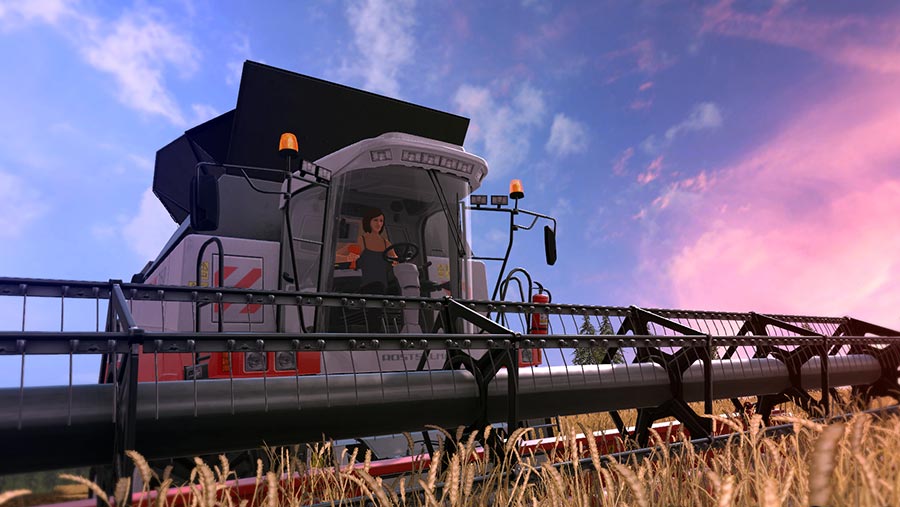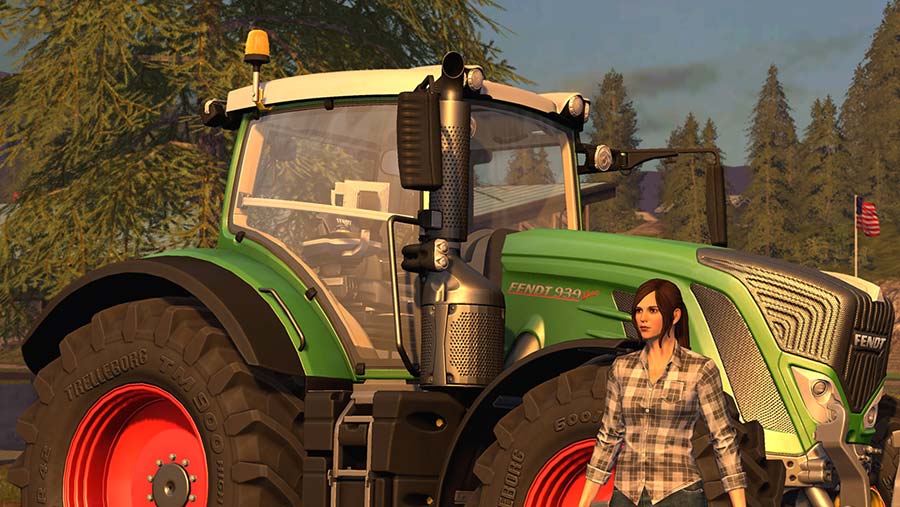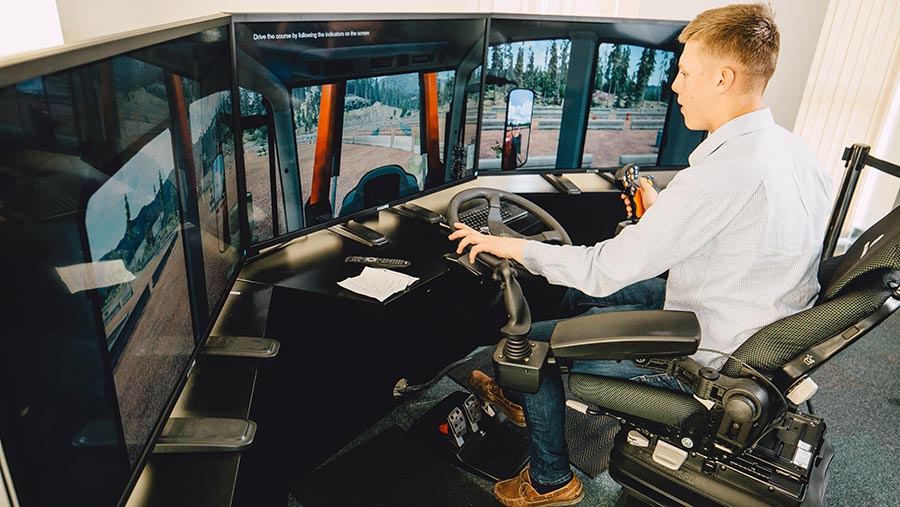How a computer game is fostering new interest in farming
The phenomenon that is the online game Farming Simulator is celebrating its 10th anniversary this year. Farmers Weekly looks at the very real impact it is having on modern-day farming.
A million copies of the latest version of the computer game Farming Simulator were sold within three weeks of its release.
It has hardly ever been out of the top 10 list of most popular games in the USA and Europe, while in Germany – where chancellor Angela Merkel is allegedly a fan of the game – it’s rarely knocked off of the number one spot.

© Farming Simulator
So, what is the secret to the success of the game known to its devotees as “farm sim”? It seems in the gaming scene there is a move away from sitting in front of a screen mindlessly killing baddies.
Gamers nowadays supposedly like the way a simulator game transports them into another, more tranquil world.
See also: Expert advice: What happens if my herd fails a TB test?
“Our feedback is that people like that the game doesn’t stress them out,” says Martin Rabl, marketing and PR manager for Giants Software, the relatively tiny firm behind Farming Simulator.

© Farming Simulator
“They like that there is no violence and that they’re not going to come off it upset because they’ve not won. There are no losers and there is something people find very relaxing about ‘working’ on a farm.
“It makes us very proud when people thank us for making more people – especially the young – interested in farming.”
Early days
Started in Switzerland, Giants first dipped its toe into the market with a skiing simulator. Then somebody who worked with the company happened to mention they were interested in farming. This moment sowed the seed for the popular game.
The firm now focuses all of its energy on Farming Simulator, with offshoot work creating training simulators for the agricultural industry for firms such as Agco and Horsch.

© Farming Simulator
While agricultural machinery manufacturers now literally queue up – as they were at November’s Agritechnica exhibition in Germany – to lobby for inclusion in the game, this wasn’t always the case.
“There was a lot of convincing to do in the early days,” says Martin. “But now we are overwhelmed with companies coming to us about their latest tool or machine.”
See also: Joe Weston: ‘Farmers Apprentice was one of the best things I’ve ever done’
What is Farming Simulator?
Farming Simulator is a video game played on games consoles, computers, and mobile devices.
The aim is to grow and harvest crops and sell them before using the money to buy more seed and better equipment.
Up to 16 people can join forces to look after one farm, much like the farmer collaboration seen in the real world.
Farmers who play the game have often said “it’s what farming will be like in heaven” with no breakdowns or worries about the weather. Just growing healthy crops under a blue sky while driving a new tractor.
Watch the video below for a flavour of what the Farming Simulator is all about.
Farming Simulator in numbers
- 8m copies sold worldwide across all versions and game console platforms
- 9 versions of the game released for computers, games consoles and mobile devices
- 2008 was the year the original Farming Simulator game launched
Learning tools
It’s not just the reaction of the machinery manufacturers that has changed over the past decade.
Agricultural colleges have had to take the influence of the game seriously and keep up with simulator technology in their bid to attract and retain students.
Bill Meredith, acting chief executive and principal of Bishop Burton and Riseholme colleges, has heard students from non-farming backgrounds talking at length about their Farming Simulator holding in interviews.
“It’s absolutely amazing the amount of detail some of them go into,” says Bill. “They take it very seriously and if it introduces a new generation to farming – which it undoubtedly has – it’s got to be a good thing.”
The colleges, Bishop Burton in East Yorkshire and Riseholme in Lincolnshire, have invested in a £25,000 multi-functional simulator students can use to practice everything from tractor driving to combine operating.
“It provides an immersive experience without the students using any diesel or coming to any harm,” explains Bill.
“Of course, there is no substitute for the real thing, but simulators are a really useful piece of kit in bringing all students up to a basic level, developing motor skills and hand-eye-co-ordination, before they are let loose behind the wheel of a real vehicle.

© Bishop Burton and Riseholme Colleges
The college also has a welding simulator to get students up to a basic level before being let loose with real metal and gas.
See also: Careers: How to get a job as a farm manager
This scores them on things like the length of arc and speed of weld. “Of course, it’s introduced a level of competitiveness which has brought a bit of fun to the topic,” says Bill.
Simulated v real-life
There are a few farming home truths that Bill and his team have had to debunk from students that join having only had experience of Farming Simulator.
“We’ve dashed a few myths,” he laughs. “On the game they make pots of money out of silage and chickens have zero maintenance and no costs involved – a far cry from real life.
“They also make money from sheep out of selling wool, which any farmer will tell them isn’t very true to real life.
“But there is a strong entrepreneurial vein running through the game; it’s all about making money. We pride ourselves on our farms being run on a commercial basis and Farming Simulator certainly helps students grasp that the bottom line has to add up.”
See also: 5 ways to use social media to get a farm job
There is evidence that students retain only 5% of information shared in a lecture, whereas it’s 75% if they are actually putting what they are learning into practice.
This is fact that Jamie Parker, who is joint head of further and higher education in the engineering department at Reaseheath College in Cheshire agrees with.
Jamie, who has special responsibility for innovation, says it is “no exaggeration” to say most of his students play Farming Simulator.
The college has long run apprenticeship training for the likes of Case, New Holland, Class and JCB and finds that gamers tend to be more adept at learning the skills involved in using diagnostic equipment.
Many gamers play Farming Simulator on their mobile phones and Jamie believes that rather than constantly battling to get students to put their phones away, colleges should use them as a learning tool.
“They can really help to embed facts,” he says. “Rather than fighting against new technology learning providers need to embrace it.”

© Bishop Burton and Riseholme Colleges
Jamie has noticed that Farming Simulator has given non-farming students a basic grasp of crops and what certain tools and machines are used for that they would never have had.
“If we are teaching somebody how to mend a piece of machinery, a plough for example, it’s half the battle if they know and understand what it is used for. Farming Simulator has revolutionised this level of understanding.”

